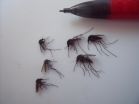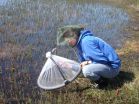Arctic mosquitoes thriving under climate change, Dartmouth study finds
2015-09-16
(Press-News.org) HANOVER, N.H. - Warming temperatures are causing Arctic mosquitoes to grow faster and emerge earlier, significantly boosting their population and threatening the caribou they feast on, a Dartmouth College study finds.
The study predicts the mosquitoes' probability of surviving and emerging as adults will increase by more than 50 percent if Arctic temperatures rise 2 °C. The findings are important because changes in the timing and intensity of their emergence affect their role as swarming pests of people and wildlife, as pollinators of tundra plants and as food for other species, including Arctic and migratory birds.
The researchers say the climate-population model they developed for Arctic mosquitoes and their predators can be generalized to any ecosystem where survival depends on sensitivities to changing temperatures.
The study appears in the journal Proceedings of the Royal Society B: Biological Sciences. A PDF is available on request.
Climate change is raising temperatures globally, which greatly influences insect physiology, growth rates and survival, including their ability to elude predators. Average temperatures in the Arctic have increased at twice the global rate in the past 100 years, and the low biodiversity of Arctic ecosystems provided a simple predator-prey interaction for this study. Arctic mosquitoes develop in shallow temporary ponds of springtime snowmelt on the tundra, where their top predators are diving beetles.
Using field and lab studies, the researchers measured the impacts of increasing temperatures on development and death rates from predation on immature mosquitoes in western Greenland. They then developed a model to evaluate how temperature affects their survival from the immature stage to adult biting stage across a range of temperatures in future climate change scenarios for the Arctic.
The results show that warmer spring temperatures caused the mosquitos to emerge two weeks early and shortened their development time through the larval and pupal stages by about 10 percent for every 1 °C increase in temperature. Warming increased the number of mosquitoes being eaten by diving beetles, but the mosquitoes' accelerated growth in their vulnerable juvenile stages lessened their time with aquatic predators, which ultimately increased their chance of surviving to adulthood. With a 2 °C warming scenario, the researchers' model predicts the mosquitoes' probability of survival will increase by 53 percent.
Arctic mosquitoes' reproductive success depends on the females finding a blood meal, which is expected to increase because warming more closely synchronizes their life cycle with caribou calving. The calving season benefits mosquitoes by giving them a larger, less mobile herd to feed on, including vulnerable calves.
"Increased mosquito abundance, in addition to northward range expansions of additional pest species, will have negative consequences for the health and reproduction of caribou," says lead author Lauren Culler, a postdoctoral researcher at Dartmouth's Dickey Center's Institute of Arctic Studies. "Warming in the Arctic can thus challenge the sustainability of wild caribou and managed reindeer in Fennoscandia (Norway, Sweden, Finland and parts of northwest Russia), which are an important subsistence resource for local communities."
INFORMATION:
Lead author Lauren Culler is available to comment at Lauren.E.Culler@dartmouth.edu. Co-authors are Matt Ayres, a professor of Biological Sciences, and Ross Virginia, a professor of Environmental Studies and director of the Institute of Arctic Studies. This study was supported by the National Science Foundation.
Broadcast studios: Dartmouth has TV and radio studios available for interviews. For more information, visit: http://www.dartmouth.edu/~opa/radio-tv-studios/
ELSE PRESS RELEASES FROM THIS DATE:
2015-09-16
A total ban on trans fatty acids (trans fats) in processed foods in England could potentially prevent or postpone about 7,200 deaths from coronary heart disease over the next five years, suggest experts in The BMJ this week.
They say a total ban in England is "technically feasible" and they call for "decisive action" to prioritise the most effective and cost effective policy options.
Industrial trans fatty acids are produced from plant oils (a process known as hydrogenation) and are commonly added to processed foods to cheaply improve shelf life and palatability.
Higher ...
2015-09-16
Public Health England (PHE) recently endorsed the use of electronic cigarettes as an aid to quitting smoking. But in The BMJ this week, experts question the evidence on safety and effectiveness underpinning the recommendations.
Professor Martin McKee at the London School of Hygiene & Tropical Medicine and Professor Simon Capewell at the University of Liverpool, argue that the available evidence about e-cigarettes "suggests that the debate is far from over and questions remain about their benefits and harms."
The PHE report concludes that e-cigarettes are much safer ...
2015-09-16
The reason why middle class people are more likely to play music, paint and act has been revealed in a major new study.
Research involving 78,000 people found that it was not wealth or social status that were strongly linked to people taking part in arts activities as amateurs or professionals.
Instead, it was the level of education that lay behind arts participation, the study by Dr Aaron Reeves, a sociologist at the University of Oxford, found.
In an article in the journal Sociology, Dr Reeves said that of the 78,011 surveyed, 18% had taken part in painting or ...
2015-09-16
A study of 6467 children from England--presented at this year's annual meeting of the European Association for the Study of Diabetes (EASD) in Stockholm--shows that no access to a garden at age 3-5 years is linked to an increased risk developing obesity by age 7 years. The research is by Annemarie Schalkwijk, VU University Medical Centre, Amsterdam, the Netherlands, and colleagues.
Overweight and obese children are at increased risk of becoming overweight and obese adults and therefore being overweight or obese in childhood is an important risk factor for developing ...
2015-09-16
A meta-analysis of 21 studies presented at this year's annual meeting the European Association for the Study of Diabetes (EASD) shows that exposure to pesticides is associated with increased risk of developing diabetes by 61%, with different types of pesticides showing varying levels of risk. The study is by Giorgos Ntritsos, University of Ioannina, Greece, and Dr Ioanna Tzoulaki and Dr Evangelos Evangelou, Imperial College London, UK, and colleagues.
How diabetes develops is considered to be an interplay between genetic and environmental factors. Emerging evidence suggests ...
2015-09-16
New research presented at this year's annual meeting of the European Association for the Study of Diabetes in Stockholm shows that a 10-times increased exposure to organic pollutants in early pregnancy is associated with a 4.4 times increased risk of a pregnant woman developing gestational diabetes. The research is by Assistant Professor Leda Chatzi, University of Crete, Heraklion, Greece.
Persistent Organic Pollutants (POPs) are a group of diverse substances, including polychlorinated biphenyls (PCBs) and organochlorine pesticides that are resistant to biodegradation ...
2015-09-15
On Sept. 13, 2015, the Solar and Heliospheric Observatory -- a joint project of the European Space Agency and NASA -- discovered its 3,000th comet, cementing its standing as the greatest comet finder of all time. Prior to the 1995 launch of the observatory, commonly known as SOHO, only a dozen or so comets had ever even been discovered from space, while some 900 had been discovered from the ground.
The 3,000th comet was originally spotted in the data by Worachate Boonplod, of Samut Songkhram, Thailand.
"I am very happy to be part of a great milestone for SOHO's comet ...
2015-09-15
UNIVERSITY PARK, Pa. -- Asking just two questions may be able to help nurses and doctors quickly and easily identify delirium in hospitalized older adults, according to health researchers.
Delirium is a reversible cognitive condition that can be resolved if caught and treated early.
"Delirium can be very costly and deadly -- and with high-risk patients, time matters," said Donna M. Fick, Distinguished Professor of Nursing and co-director of the Hartford Center of Geriatric Nursing Excellence at Penn State. "Our ultra-brief two-item bedside test for delirium takes an ...
2015-09-15
According to a NASA analysis of satellite data, the 2015 Arctic sea ice minimum extent is the fourth lowest on record since observations from space began.
The analysis by NASA and the NASA-supported National Snow and Ice Data Center (NSIDC) at the University of Colorado at Boulder showed the annual minimum extent was 1.70 million square miles (4.41 million square kilometers) on Sept. 11. This year's minimum is 699,000 square miles (1.81 million square kilometers) lower than the 1981-2010 average.
Arctic sea ice cover, made of frozen seawater that floats on top of the ...
2015-09-15
Earth's gravity has influenced the orientation of thousands of faults that form in the lunar surface as the moon shrinks, according to new results from NASA's Lunar Reconnaissance Orbiter (LRO) spacecraft.
In August, 2010, researchers using images from LRO's Narrow Angle Camera (NAC) reported the discovery of 14 cliffs known as "lobate scarps" on the moon's surface, in addition to about 70 previously known from the limited high-resolution Apollo Panoramic Camera photographs. Due largely to their random distribution across the surface, the science team concluded that the ...
LAST 30 PRESS RELEASES:
[Press-News.org] Arctic mosquitoes thriving under climate change, Dartmouth study finds





